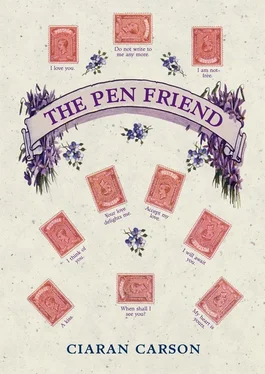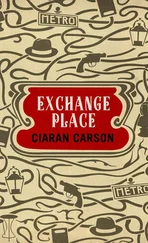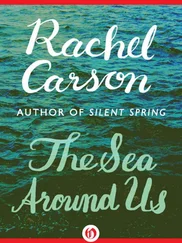It’s like this, he said, I was given an offer I couldn’t refuse. Gabriel’s mother put me up to it, it was all her fault, he said, and he winked ruefully at me, for I knew the story well. Yes, he said, it was just after the War, the top brass approached me, said if I went for Inspector, I’d have no problem, only I’d have to go on a training course to London. And the last thing I wanted to do was to go to London, you see, conscription was still in force then, on the mainland as they call it, and I didn’t want to risk that, being a member of His Majesty’s Armed Forces, it would go against everything I believed in, said my father. But you went anyway, you said. Yes, said my father, it was either that or a lifetime of misery from Gabriel’s mother. But you escaped, you said. By the grace of God, said my father. But you work for Her Majesty’s Royal Mail, you said boldly, raising your eyes to the Crown insignia on his peaked cap. But I don’t carry a gun for her, said my father, the pen is mightier than the sword, and anyone can hold a pen freely, be he Irish or English or Catholic or Protestant. It was the Irish who brought the pen all over Europe, the monks who held the flame of learning aloft throughout the Dark Ages. In this sign shall you conquer. That’s what I’ve tried to teach Gabriel. Do you think I’ve succeeded, Miranda? Oh yes, Mr Conway, I’m sure you have, you said, and you fondled the little Dinkie that dangled at your breast. Nice pen, said my father.
When he left, I told you the other side of the coin, that my father had been interned for six weeks in 1941, suspected of being a member of the IRA, which in Belfast at that time consisted of a few dozen militarily incompetent idealists. I think the Powers That Be thought they might be in league with the Nazis, which maybe wasn’t too far from the truth in the case of the more fanatical elements, I said. Maybe your father’s promotion was a quid pro quo for his imprisonment, you said. First they give him the bad news, then they give him the good news, you know, bad cop, good cop routine. That’s a bit far-fetched, Nina, I said. There was what, a seven-year gap between his internment and his promotion, do you think they work that far ahead? Or that far in retrospect? Well, you never know, you murmured. No, I said, the interesting thing was, it was a case of mistaken identity, my father had nothing to do with the IRA, the person they wanted was his twin brother, Gerry, they lifted George instead of Gerry. Anyway, they got Gerry too. He was in for the duration, they let him out in 1945, I said. And what happened to him? you said. Oh, he died in 1964. Heart attack. It was the first time I saw my father cry. When the news came — this uncle of mine, Joe Marley, they called him the Angel of Death, because he always got the job of breaking the bad news when there was a death in the family, or in a neighbour’s family, for that matter — he came to the door, my father answered it, and he knew by the expression on the Angel’s face, he didn’t have to be told, that Gerry was dead. And he burst into tears, he sobbed for a good half hour.
He died young, you said. Yes, I said, after Gerry got out of prison, it was difficult for him to get work, as you might guess, just the odd casual job working in the bakery or the docks. He’d give most of his wages to my Auntie Maureen, and save a little for himself, enough to go on a monthly binge. He wasn’t a heavy drinker, you understand. It was a very controlled thing, once a month for years, he’d go out on a tear, all the pubs of the Falls Road, or quite a few of them, for there were a great deal of pubs in the Falls then, each with their own wee quirks and characters. Joyce would have had a field day there. And my Uncle Gerry would come home speechless with drink, and fall into bed and sleep all the way through the next day. Then he’d get up as if it never happened, the monthly oblivion. But I like to think he had some crack along the way. He was a great storyteller, like my father, and like him he read a lot of books, taught me to play chess. And oh, yes, he collected stamps. He gave me his stamp album before he died. A more innocuous man you couldn’t imagine.
They put the Tricolour on his coffin when they buried him, I helped to carry the coffin, I still remember the weight of it and the way it cut into my shoulder, I was only sixteen. And perhaps I never fully understood then why my father had been so deeply affected, but now I think he must have felt guilty, because Gerry had done real time for Ireland, and he hadn’t. And my father was the Irish speaker, Gerry wasn’t. Gerry was a foot soldier, but my father must have admired him for the stupid courage of his convictions, Gerry who was just as intelligent as him, if not more so. My father had done well in life, George had done well, and Gerry hadn’t. George had compromised with the Powers That Be, and Gerry hadn’t. George took the King’s shilling; Gerry remained penniless, I said. But your father was right, to take the opportunity to advance himself, you said. But he didn’t particularly want to advance himself, it was my mother who wanted him to advance himself, I said. And you, Angel, what about you? you said. What about me? I said. Well, isn’t there some kind of parallel of compromise here, like father, like son? you said. And we began to rehearse an argument which by now had become familiar.
When I began this letter yesterday I had a suspicion I would get round to my uncle’s story sooner or later, so I’ve been writing this using two pens alternately, a paragraph in one, a paragraph in the other. One is a Kingswood in Pearlised Blue Onyx, which demanded to be chosen not for its attractive colouring, but because engraved on its cap is the inscription
WALDRON WELCOME HOME1939–45
from which I presume that it was one of a batch given to the homecoming soldiers of Waldron, a village in East Sussex which lay in Bomb Alley, where German aircraft would drop their bombs on their way to and from London. Most of its young men went to the war, and twenty-two of them died in action. Those that survived were given a pen, mightier now than the sword, as they entered civvy street. I wonder how many of those pens found employment; this one, at any rate, has seen some action, for there is a ghost of a personalised scratch to its nib as I write, and it sends a shiver up my spine to think that I touch what he once touched, that I hold in my hand an instrument held by the hand of a soldier. The other pen is a Conway Stewart Scribe made in 1941 or so, in green and brown patchy swirls veined with black, a pattern known as Camouflage. If you lost this pen in a field, it would be difficult to find. But the pen led me to discover that the Surrealist artist Roland Penrose had been one of the Chief Advisors to the Camouflage Development and Training Centre set up in 1940 by the War Office, and was the author of The Home Guard Manual of Camouflage . He was also, at that time, conducting an affair with Lee Miller, whom he married in 1947. He had painted his own car in a disruptive pattern, and on one occasion had experimented with a matt green camouflage cream, which he smeared on the naked body of his lover as she lay on the grass of a friend’s garden, covered with netting taken from the raspberry patch. Penrose was delighted with the results, declaring that if you could hide such eye-catching attractions as hers from the invading Hun, smaller and less seductive areas of skin would stand an even better chance of becoming invisible.
Penrose was not the only artist involved with camouflage; in fact, its principles had first been outlined in 1897 by the American painter Abbott H. Thayer, in an article called ‘The Law which Underlines Protective Coloration’. The spectator, he said, seems to see right through the space really occupied by an opaque animal. Nature, he believed, acts like an artist, and the study of these optical effects belongs to the realm of pictorial art and can only be interpreted by painters. For art and camouflage are two sides of the same coin: art makes something unreal recognisable, the other makes something real unrecognisable. Thayer also thought that the concept might have military applications, but these were not followed through until the First World War, when Lucien Victor Girand de Scévola, an artist serving in the French infantry, established the first Section de Camouflage . He was influenced in his approach by the Cubist work of Picasso, in which familiar things — bottles, pitchers, glasses, newspapers, the paraphernalia of café life and conversation — were taken apart and put together again in a series of flat, intersecting planes, sometimes showing different aspects of the same thing simultaneously. I well remember at the beginning of the war, wrote Gertrude Stein, being with Picasso on the boulevard Raspail, when the first camouflaged truck passed by. It was night, we had heard of camouflage but we had not seen it, and Picasso, amazed, looked at it, saw it, and then cried out, Yes, it is we who made it, that is Cubism. And a playful remark made by Picasso to Jean Cocteau, that the army would better dazzle the enemy if they were dressed in harlequin costumes, might have led indirectly to the concept known as ‘dazzle painting’.
Читать дальше












